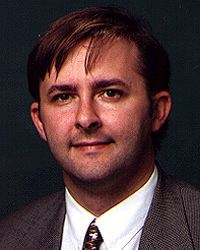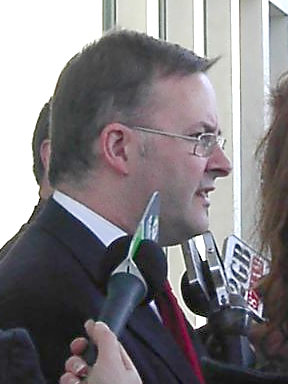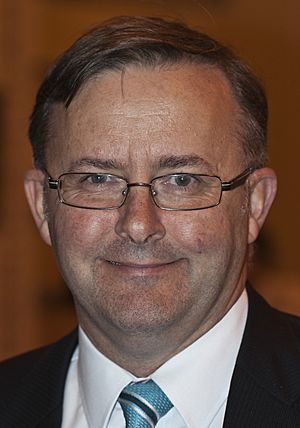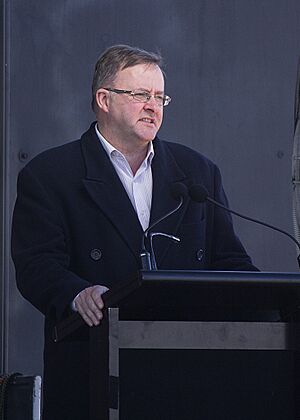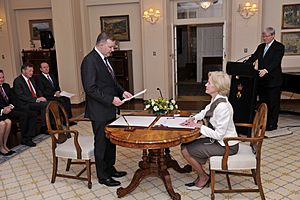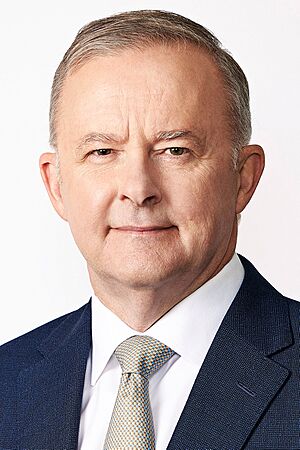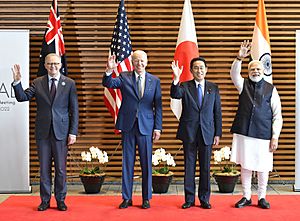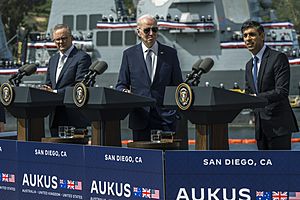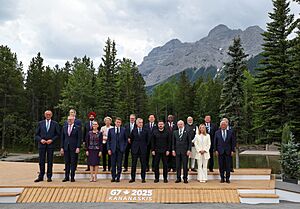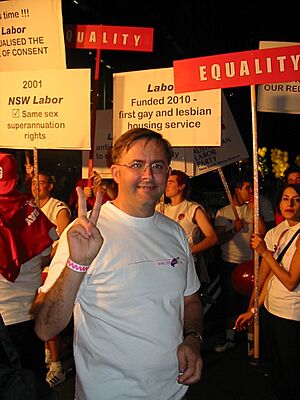Anthony Albanese facts for kids
Quick facts for kids
Anthony Albanese
|
|||||||||||||||||||||||||||||||||||||||||||||||||||||||||||||||||
|---|---|---|---|---|---|---|---|---|---|---|---|---|---|---|---|---|---|---|---|---|---|---|---|---|---|---|---|---|---|---|---|---|---|---|---|---|---|---|---|---|---|---|---|---|---|---|---|---|---|---|---|---|---|---|---|---|---|---|---|---|---|---|---|---|---|
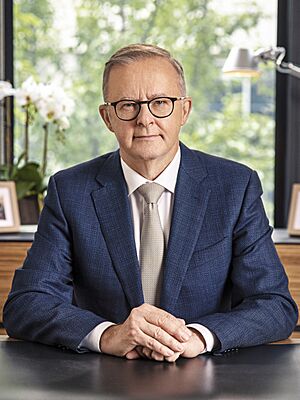
Official portrait, 2022
|
|||||||||||||||||||||||||||||||||||||||||||||||||||||||||||||||||
| 31st Prime Minister of Australia | |||||||||||||||||||||||||||||||||||||||||||||||||||||||||||||||||
| Assumed office 23 May 2022 |
|||||||||||||||||||||||||||||||||||||||||||||||||||||||||||||||||
| Monarch | |||||||||||||||||||||||||||||||||||||||||||||||||||||||||||||||||
| Governor General | |||||||||||||||||||||||||||||||||||||||||||||||||||||||||||||||||
| Deputy | Richard Marles | ||||||||||||||||||||||||||||||||||||||||||||||||||||||||||||||||
| Preceded by | Scott Morrison | ||||||||||||||||||||||||||||||||||||||||||||||||||||||||||||||||
| 21st Leader of the Labor Party | |||||||||||||||||||||||||||||||||||||||||||||||||||||||||||||||||
| Assumed office 30 May 2019 |
|||||||||||||||||||||||||||||||||||||||||||||||||||||||||||||||||
| Leader of the Labor Party|Deputy | Richard Marles | ||||||||||||||||||||||||||||||||||||||||||||||||||||||||||||||||
| Preceded by | Bill Shorten | ||||||||||||||||||||||||||||||||||||||||||||||||||||||||||||||||
| Leader of the Opposition | |||||||||||||||||||||||||||||||||||||||||||||||||||||||||||||||||
| In office 30 May 2019 – 23 May 2022 |
|||||||||||||||||||||||||||||||||||||||||||||||||||||||||||||||||
| Prime Minister | Scott Morrison | ||||||||||||||||||||||||||||||||||||||||||||||||||||||||||||||||
| Deputy | Richard Marles | ||||||||||||||||||||||||||||||||||||||||||||||||||||||||||||||||
| Preceded by | Bill Shorten | ||||||||||||||||||||||||||||||||||||||||||||||||||||||||||||||||
| Succeeded by | Peter Dutton | ||||||||||||||||||||||||||||||||||||||||||||||||||||||||||||||||
| Deputy Prime Minister of Australia | |||||||||||||||||||||||||||||||||||||||||||||||||||||||||||||||||
| In office 27 June – 18 September 2013 |
|||||||||||||||||||||||||||||||||||||||||||||||||||||||||||||||||
| Prime Minister | Kevin Rudd | ||||||||||||||||||||||||||||||||||||||||||||||||||||||||||||||||
| Preceded by | Wayne Swan | ||||||||||||||||||||||||||||||||||||||||||||||||||||||||||||||||
| Succeeded by | Warren Truss | ||||||||||||||||||||||||||||||||||||||||||||||||||||||||||||||||
| Deputy Leader of the Labor Party | |||||||||||||||||||||||||||||||||||||||||||||||||||||||||||||||||
| In office 26 June – 13 October 2013 |
|||||||||||||||||||||||||||||||||||||||||||||||||||||||||||||||||
| Leader | Kevin Rudd | ||||||||||||||||||||||||||||||||||||||||||||||||||||||||||||||||
| Preceded by | Wayne Swan | ||||||||||||||||||||||||||||||||||||||||||||||||||||||||||||||||
| Succeeded by | Tanya Plibersek | ||||||||||||||||||||||||||||||||||||||||||||||||||||||||||||||||
|
|||||||||||||||||||||||||||||||||||||||||||||||||||||||||||||||||
| Member of the Australian Parliament for Grayndler |
|||||||||||||||||||||||||||||||||||||||||||||||||||||||||||||||||
| Assumed office 2 March 1996 |
|||||||||||||||||||||||||||||||||||||||||||||||||||||||||||||||||
| Preceded by | Jeannette McHugh | ||||||||||||||||||||||||||||||||||||||||||||||||||||||||||||||||
| Personal details | |||||||||||||||||||||||||||||||||||||||||||||||||||||||||||||||||
| Born | 2 March 1963 Darlinghurst, New South Wales, Australia |
||||||||||||||||||||||||||||||||||||||||||||||||||||||||||||||||
| Political party | Labor (since 1979) | ||||||||||||||||||||||||||||||||||||||||||||||||||||||||||||||||
| Spouse |
Carmel Tebbutt
(m. 2000; div. 2019) |
||||||||||||||||||||||||||||||||||||||||||||||||||||||||||||||||
| Domestic partners | Jodie Haydon (2021–present, engaged in 2024) | ||||||||||||||||||||||||||||||||||||||||||||||||||||||||||||||||
| Children | 1 | ||||||||||||||||||||||||||||||||||||||||||||||||||||||||||||||||
| Residences |
|
||||||||||||||||||||||||||||||||||||||||||||||||||||||||||||||||
| Alma mater | University of Sydney (BEc) | ||||||||||||||||||||||||||||||||||||||||||||||||||||||||||||||||
| Signature |  |
||||||||||||||||||||||||||||||||||||||||||||||||||||||||||||||||
| Website |
|
||||||||||||||||||||||||||||||||||||||||||||||||||||||||||||||||
| Nickname | Albo | ||||||||||||||||||||||||||||||||||||||||||||||||||||||||||||||||
Anthony Norman Albanese (born 2 March 1963) is an Australian politician. He has been the 31st and current prime minister of Australia since May 2022. He is also the leader of the Labor Party since 2019. He has been a member of parliament (MP) for the area of Grayndler in New South Wales since 1996.
Albanese was born in Sydney and studied economics at the University of Sydney. He joined the Labor Party as a student. Before becoming an MP, he worked for the party. He was first elected to the House of Representatives in 1996. He became a minister in 2007 and was even Deputy Prime Minister for a short time in 2013. After Labor lost the 2013 election, he became a senior member of the opposition. In 2019, he became the leader of the Labor Party. He led his party to victory in the 2022 election and became Prime Minister.
As Prime Minister, Albanese has focused on several key areas. These include managing the cost-of-living crisis, trying to change the Constitution to include an Indigenous Voice to Parliament, and updating Australia's climate goals. He also made changes to workplace laws and created a new anti-corruption commission. In foreign policy, he has worked to strengthen relationships with other countries and supported Ukraine. His government was re-elected in a landslide victory in the 2025 election.
Contents
- Early Life and Education
- Journey to Parliament
- Becoming a Cabinet Minister
- Back in Opposition
- Leader of the Opposition (2019–2022)
- Prime Minister of Australia (2022–Present)
- Political Views
- Personal Life
- See also
Early Life and Education
Family Background
Anthony Albanese was born on 2 March 1963 in Darlinghurst, Sydney. His mother, Maryanne Ellery, was Australian. His father, Carlo Albanese, was from Italy. His parents met on a ship in 1962 but did not stay together. Anthony's mother raised him, and he was told his father had died.
He later found out his father was alive and met him in Italy in 2009. His father passed away in 2014. Anthony also discovered he had two half-siblings.
Growing Up and School
Albanese grew up with his mother and grandparents in a public housing home in Camperdown, Sydney. His mother worked part-time and lived on a disability pension due to rheumatoid arthritis.
He went to St Joseph's Primary School and then St Mary's Cathedral College. While at school, he sold newspapers. He joined the Australian Labor Party (ALP) when he was 15 years old.
After school, he worked briefly at a bank before studying economics at the University of Sydney. He became involved in student politics there.
Before Parliament
After finishing his degree in 1984, Albanese worked as a research officer for a government minister, Tom Uren, who became a mentor to him. For six years, he was a senior official for the Labor Party in New South Wales. In 1995, he worked as an adviser to the New South Wales Premier, Bob Carr.
Journey to Parliament
Becoming an MP
In 1996, the local MP for Grayndler, Jeannette McHugh, decided not to run again. Anthony Albanese was chosen to run for the Labor Party in that area. He won the election and became a member of the House of Representatives.
In his first speech to Parliament, Albanese talked about issues important to his area, like aircraft noise. He also spoke about supporting public services, multiculturalism, and childcare. He wanted to be remembered as someone who stood up for working-class people and for Australia's progress.
He also strongly supported equal rights for same-sex couples, especially regarding superannuation (retirement savings). He worked for many years to change laws on this issue, and they were finally passed in 2007. Later, he campaigned for same-sex marriage.
Roles in Opposition
In 1998, Albanese became a parliamentary secretary, which is a role that helps ministers. This often leads to bigger jobs. In 2001, he joined the opposition's team of spokespeople, called the Shadow Cabinet. He held different roles, including Shadow Minister for Environment and Heritage. He spoke out against nuclear power during this time.
In 2006, when Kevin Rudd became the leader of the Labor Party, Albanese became the Manager of Opposition Business. This is an important role that helps manage how the opposition works in Parliament.
Becoming a Cabinet Minister
In the Rudd Government
After Labor won the 2007 election, Albanese became a senior minister in the government led by Kevin Rudd. He was made Minister for Infrastructure and Transport and Leader of the House.
One of his first actions was to create Infrastructure Australia. This group gives advice to the government on important building projects like roads and railways. Thanks to this, there was a big increase in money for roads and rail.
In the Gillard Government
When Julia Gillard became Prime Minister in 2010, Albanese kept his roles. After the 2010 election, which resulted in a hung parliament (meaning no party had a clear majority), Albanese played a key role in getting support from independent MPs to form a government.
He also worked on new policies for city planning and shipping. During this time, there were disagreements within the Labor Party about leadership. Albanese called for the party to unite.
Deputy Prime Minister
In June 2013, Kevin Rudd became Prime Minister again. Albanese was elected as the Deputy Leader of the Labor Party. The next day, he was sworn in as Deputy Prime Minister. He held this role for less than three months, as Labor lost the 2013 election.
Back in Opposition
2013 Leadership Race
After Labor's defeat in 2013, Albanese ran to become the Leader of the Labor Party. He ran against Bill Shorten. Even though Albanese won more votes from party members, Shorten had more support from MPs and became the leader.
Shadow Minister Roles
Shorten then appointed Albanese to his Shadow Cabinet. Albanese became the Shadow Minister for Infrastructure and Transport and Shadow Minister for Tourism. He held these roles throughout Shorten's time as leader.
Leader of the Opposition (2019–2022)
Becoming Leader
After Labor unexpectedly lost the 2019 election, Bill Shorten resigned as leader. Anthony Albanese was the only person nominated to replace him, so he became the leader of the Labor Party without opposition on 30 May 2019. He became the Leader of the Opposition.
Leading the Opposition
As Opposition Leader, Albanese led Labor through the COVID-19 pandemic. He supported some of the government's actions during this time. In February 2022, Labor supported a bill about religious discrimination, but also added changes to protect transgender students.
2022 Federal Election
The 2022 federal election was held on 21 May. Albanese led Labor's campaign. He faced Prime Minister Scott Morrison in several debates. Albanese tested positive for COVID-19 during the campaign, which meant he had to isolate at home for a week.
Labor's campaign focused on reducing the cost of medicine and childcare, increasing manufacturing, and helping first-time home buyers.
Prime Minister of Australia (2022–Present)
First Term (2022–2025)
At the election on 21 May 2022, Labor won against the Liberal–National Coalition. Anthony Albanese became the 31st prime minister of Australia. He was sworn in on 23 May 2022. With his victory, he became the first Australian Prime Minister with Italian heritage.
Labor won enough seats to form a majority government. Albanese's full team of ministers was sworn in on 1 June.
Key Domestic Policies
Economy and Cost of Living
A big challenge during Albanese's first term was Australia's cost-of-living crisis. This was caused by a worldwide increase in prices. The government worked to manage inflation and interest rates. In 2023 and 2024, the government achieved budget surpluses, meaning they spent less than they earned.
In January 2024, the government changed tax cuts to give more help to people earning less money. These changes were popular with the public.
Housing
Albanese's government faced a major housing affordability crisis. In August 2023, they agreed with state leaders to build 1.2 million new homes over five years. They also created a $10 billion fund to build affordable homes. In November 2024, a "help-to-buy" scheme was introduced to help first-time home buyers. In February 2025, a two-year ban was placed on non-citizens buying existing houses.
Manufacturing and Green Energy
In March 2023, the government created a $15 billion fund to invest in Australian manufacturing. In April 2024, Albanese announced a plan called "Future Made in Australia." This plan aims to boost Australian manufacturing in sustainable energy, like green hydrogen and solar panels.
Climate Change and Environment
On 16 June 2022, Australia committed to reducing carbon emissions by 43% by 2030. This target was written into law in September 2022. The government also reformed a system that makes large businesses reduce their emissions. In December 2023, a "nature repair market" was created to encourage investment in protecting nature.
In December 2022, the government put temporary limits on gas and coal prices to help control electricity costs.
Workplace Laws
Albanese's government made changes to workplace laws. They supported an increase in the national minimum wage. New laws were passed to allow unions to negotiate pay deals for many workers at once. They also introduced laws to ensure temporary workers get fair pay and to make companies responsible for serious workplace accidents.
Indigenous Affairs
Albanese supported the Uluru Statement from the Heart. He pledged to hold a referendum to create an Indigenous Voice to Parliament in the Constitution. This referendum was held on 14 October 2023, but the proposed change was not approved by voters.
Social Media
In June 2024, Albanese pledged to introduce laws to stop children under 16 from creating social media accounts. This law, the Online Safety Amendment (Social Media Minimum Age) Act 2024, was passed in November 2024. It will start by the end of 2025.
Health and Aged Care
In May 2023, the government invested $3.5 billion to make it easier for doctors to bulk bill patients, meaning patients don't pay upfront. They also opened urgent care clinics across Australia. The government passed laws to improve funding and transparency in aged care and to subsidise childcare costs for families.
Government Integrity
In November 2022, Albanese's government created the National Anti-Corruption Commission (NACC) to investigate corruption.
International Relations
Albanese's first international trip was to Tokyo on 23 May 2022, immediately after being sworn in. He attended a meeting with leaders from the US, India, and Japan. He also visited Indonesia to strengthen ties.
He visited Ukraine in July 2022 to meet President Volodymyr Zelenskyy and pledged more aid for the Russo-Ukrainian War. He also worked to improve Australia's relationship with China, which had been difficult. Trade restrictions between the two countries began to ease.
In March 2023, Albanese officially started the AUKUS security agreement with the US and UK. This deal involves Australia getting nuclear-powered submarines. In September 2023, Australia and the Philippines upgraded their relationship to a strategic partnership.
Between 4 and 7 November 2023, Albanese visited China, becoming the first Australian prime minister to visit in seven years. He also signed the Falepili Union treaty with the Pacific island nation of Tuvalu, offering support for climate change and resettlement.
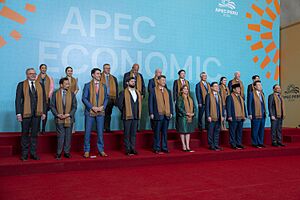
In April 2024, Albanese spoke out about the death of an Australian aid worker in Gaza. He condemned Iranian strikes in Israel and called for sanctions against Iran. In March 2025, he urged all parties to respect a ceasefire in the Gaza war.
Second Term (2025–Present)
On 28 March 2025, Albanese called a federal election for 3 May. The campaign focused on cost of living, housing, healthcare, and immigration.
Albanese led his government to a big victory in the election. Labor gained 17 seats, holding a total of 94 seats in the House of Representatives. This was one of the largest wins for a party in federal Parliament. The second Albanese ministry was sworn in on 13 May 2025.
Domestic Plans
Albanese pledged that his first action in his second term would be to reduce university fees by 20%.
Foreign Affairs
On 14 May 2025, Albanese visited Indonesia to discuss defence and trade. On 19 May, he attended the inauguration of Pope Leo XIV and invited him to visit Australia.
In May 2025, Albanese called for humanitarian aid to be allowed into the Gaza Strip. In June 2025, he attended the 51st G7 summit. He also gave a speech about Australia needing to follow its own interests in foreign policy. In July 2025, Albanese visited China again.
Political Views
Albanese describes his political views as progressive. He is part of the Labor Left faction of his party. However, some people have noted that his views seemed to become more centrist during the 2022 election campaign.
Albanese supports Australia becoming a republic, meaning it would no longer have the British monarch as its head of state. He also strongly supports recognising Indigenous Australians in the Constitution.
Environment and Climate
Albanese is a strong supporter of renewable energy in Australia. He has said that Australia's future is in renewable energy. When he was elected in 2022, he promised to end the "climate wars" and make addressing climate change in Australia a priority.
Foreign Policy Views
Albanese has been interested in foreign policy for a long time. He was against the US-led invasion of Iraq. He also repeatedly called for the release of Australian whistleblower Julian Assange, who was held in custody in the United Kingdom until 2024.
In February 2022, Albanese condemned Russia's invasion of Ukraine. In May 2022, he said Australia's relationship with China would be "difficult." He has spoken out about human rights issues in China.
Israel-Palestine Conflict
Albanese has shown interest in the Israeli–Palestinian conflict. He helped create a parliamentary group called "Friends of Palestine" in 1998. He has been critical of the Boycott, Divestment and Sanctions movement. In October 2022, his government changed a previous decision to recognise West Jerusalem as Israel's capital. In December 2023, he signed a statement with other prime ministers calling for a ceasefire in the Gaza war.
Social Issues
Albanese is a strong supporter of LGBT rights and has often participated in the Sydney Gay and Lesbian Mardi Gras. He voted in favour of legalising same-sex marriage in Australia. He also supports transgender rights.
Albanese has changed his stance on turning back asylum seeker boats. While he once said he couldn't do it, his government now includes boat turnbacks in its policy.
Personal Life
In 2000, Albanese married Carmel Tebbutt, who later became a politician in New South Wales. They have one son together. They separated in January 2019. In June 2020, it was reported that Albanese was in a relationship with Jodie Haydon. They met at a dinner event. In February 2024, Albanese announced his engagement to Haydon. Their wedding was held after the 2025 Australian federal election.
Albanese describes himself as "half-Italian and half-Irish" and a "non-practising Catholic." He is a big music fan and has even co-hosted a music TV show.
He is a lifelong supporter of the South Sydney Rabbitohs rugby league club. He was on the club's board and helped them get back into the National Rugby League (NRL) competition. He is also a fan of Australian rules football.
In January 2021, Albanese was in a car accident. He was injured but recovered. After the accident, he lost a lot of weight by changing his diet. He still has some ongoing spinal issues from the crash.
Albanese owns several properties in Sydney and Canberra. In 2024, he and Jodie Haydon bought a house on the Central Coast.
See also
 In Spanish: Anthony Albanese para niños
In Spanish: Anthony Albanese para niños
- First Rudd Ministry (2007–2010)
- First Gillard Ministry (June–September 2010)
- Second Gillard Ministry (2010–2013)
- Second Rudd Ministry (June–September 2013)
- Shadow Ministry of Anthony Albanese (2019–2022)
- Albanese Ministry (2022–present)
 | Claudette Colvin |
 | Myrlie Evers-Williams |
 | Alberta Odell Jones |


